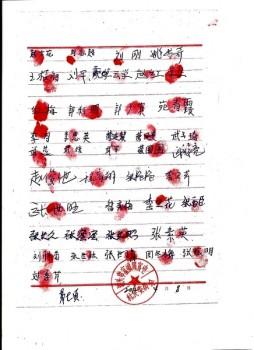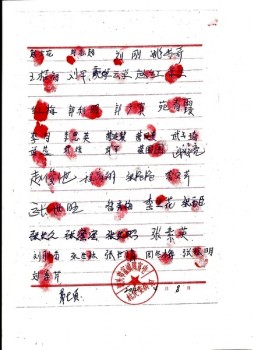Petitioners in Beijing have expressed admiration for the 300 villagers who called for the release of a Falun Gong practitioner via a petition signed with their real names and fingerprints, in Zhouguantun, Hebei Province.
Falun Gong has been persecuted and defamed by the regime for 13 years, and many lawyers and human rights activists have been detained and tortured for taking up a case defending practitioners. Thousands of Falun Gong practitioners have been tortured and killed.
“Nowadays no one dares to say a word on behalf of Falun Gong. These villagers have a strong conscience. They dared submit their thumbprints, which is admirable,” said Du Mingrong, 60, from northeast China, who has been appealing in Beijing since 1999 for the sentencing of her mother in a legal case. She has been sent to a labor camp several times for appealing.
Wang Xiaodong, the Falun Gong practitioner at the center of the village petition, was arrested late February after police found a compact disk containing information about Falun Gong. His elderly mother and 7-year-old son were left to fend for themselves.
When the villagers, dubbed the “Brave 300” in Chinese media, put their names and prints on the petition, it reportedly made it to China’s highest governing body, the Politburo, and was circulated among high-level officials. It prompted some Chinese officials to consider redressing the persecution of Falun Gong.
However, local police officials forced some of the villagers to recant their statement and detained others. Two other Falun Gong practitioners were arrested several weeks after Wang was detained, but officials have denied knowledge of it.
“Those who submitted thumbprints were not Falun Gong practitioners, but it was because Falun Gong practitioners were kind and had moved the villagers that the villagers were willing to put their names on the line,” Du Mingrong said. “The common people in China are waking up and learning about the wrongful persecution. After so many years, the people are able to see the truth, proving that Falun Gong has been right.”
Click www.ept.ms/ccp-crisis to read about the most recent developments in the ongoing crisis within the Chinese communist regime. In this special topic, we provide readers with the necessary context to understand the situation. Get the RSS feed. Get the new interactive Timeline of Events. Who are the Major Players? ![]()
Du added that many people in China don’t agree with the communist regime’s propaganda about Falun Gong.
“I’ve always had a good impression of Falun Gong practitioners, dating back before the persecution started. They are so kind and never lie to anyone,” said Du, who is not a Falun Gong practitioner.
In 2002, Du said she was arrested and taken to a police station near Tiananmen Square for appealing in Beijing. Most petitioners who were detained were allowed to walk around outside and drink water, she said.
“However, Falun Gong practitioners were detained in a big cage and were beaten and cursed. No matter how they were treated, they handled everything with a smile. I was truly moved by that scene,” Du said.
Zhou Yongkang, the head of the powerful Political and Legislative Affairs Commission, is responsible for the continued persecution of Falun Gong, but has also cracked down heavily on petitioners.
Wu Tianli, who has appealed in Beijing because she was forced from her home that was later demolished by the communist regime, expressed her admiration for the villagers who petitioned for the release of the Falun Gong practitioner. Wu said the incident means that ordinary Chinese people still have the courage to stand up for what is right.
Amnesty International issued an urgent appeal on May 31, calling attention to the “Brave 300” and urged the release of Wang Xiaodong and his sister Wang Xiaomei, also known as Wang Junling.
Many Chinese scholars and lawyers have also focused their attention on the “Brave 300” case, with some writing to appeal to top Chinese officials to treat Falun Gong fairly.
Editor’s Note: When Chongqing’s former top cop, Wang Lijun, fled for his life to the U.S. Consulate in Chengdu on Feb. 6, he set in motion a political storm that has not subsided. The battle behind the scenes turns on what stance officials take toward the persecution of Falun Gong. The faction with bloody hands—the officials former CCP head Jiang Zemin promoted in order to carry out the persecution—is seeking to avoid accountability for their crimes and to continue the campaign. Other officials are refusing any longer to participate in the persecution. Events present a clear choice to the officials and citizens of China, as well as people around the world: either support or oppose the persecution of Falun Gong. History will record the choice each person makes.
Read the original Chinese article.
The Epoch Times publishes in 35 countries and in 19 languages. Subscribe to our e-newsletter.







